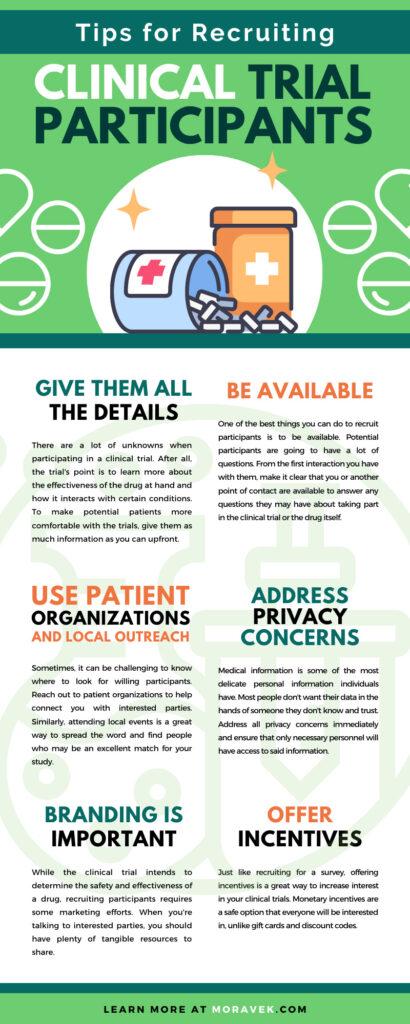
Clinical trials are essential to medical research. Bringing a new drug to the market largely relies on safe and effective clinical trial results. However, finding willing participants to participate in clinical trials can be challenging. Many patients may find the idea of trying a new drug too risky even to consider taking a substance that is still in the clinical trial phase. Without a large pool of patients willing to take this risk, your drug won't ever see the market, or you risk receiving varying results. Use these tips for recruiting clinical trial participants to run the best clinical trial possible.
Recruiting Tips for Clinical Trials
Give Them All the Details
There are a lot of unknowns when participating in a clinical trial. After all, the trial's point is to learn more about the effectiveness of the drug at hand and how it interacts with certain conditions. To make potential patients more comfortable with the trials, give them as much information as you can upfront.
Provide plenty of resources on what participating in a clinical trial looks like, what the medication’s intended effects are, as well as detailed information on the drug itself. There are hundreds of pharmaceutical manufacturing companies in the world today. Direct patients to the company they'll be dealing with to become more comfortable with their product and business.
Use Patient Organizations and Local Outreach
Sometimes, it can be challenging to know where to look for willing participants. Reach out to patient organizations to help connect you with interested parties. Similarly, attending local events is a great way to spread the word and find people who may be an excellent match for your study. However, be sure to thoroughly screen interested parties when reaching out at local events. While screening is essential no matter who you recruit, patient organizations will provide more direct connections to patients that fit the requirements necessary than local events will.
Branding Is Important
While the clinical trial intends to determine the safety and effectiveness of a drug, recruiting participants requires some marketing efforts. When you're talking to interested parties, you should have plenty of tangible resources to share. Pamphlets and educational materials should all be readily available and positioned toward your target audience, including images they can connect with and which highlight their experiences with the condition the drug aims to treat.
The more you're able to cater to patients and their troubles, the more willing and open they may be to joining the clinical trials. A one size fits all approach will not yield successful recruitment.
You Have To Recruit the Family Too
In some instances, clinical trials require the involvement of family members as well. For example, A clinical trial for a memory loss condition will require family members' input and observations to determine if the drug is working.
In other cases, other family members may not be comfortable with their loved ones going through clinical trials. In these instances, you'll want to give the family members all the same recruiting materials that you've shared with the patient, treating them as if they were participating as well.
Be Available
One of the best things you can do to recruit participants is to be available. Potential participants are going to have a lot of questions. From the first interaction you have with them, make it clear that you or another point of contact are available to answer any questions they may have about taking part in the clinical trial or the drug itself. You may be able to answer a question or alleviate a stressor that was holding them back from participating in the first place.
Loop Back Around
Reaching out to interested parties won't be enough. After you make the first point of contact, make sure you have their contact information to follow up. Reaching out again may spark interest and convince them to take part in the study.
Offer Incentives
Just like recruiting for a survey, offering incentives is a great way to increase interest in your clinical trials. Monetary incentives are a safe option that everyone will be interested in, unlike gift cards and discount codes. Offering reimbursement for study-related expenses is also a beneficial method of recruiting patients who are on the fence about participating. Of course, be sure all incentives and offerings use ethical proceedings.
Address Privacy Concerns
Medical information is some of the most delicate personal information individuals have. Most people don't want their data in the hands of someone they don't know and trust. Address all privacy concerns immediately and ensure that only necessary personnel will have access to said information.
Tips for Retaining Participants in Clinical Trials
After recruiting participants, you'll want to switch focus to retaining them. Many of the same recruitment tactics can help retain patients, such as incentives, looping back around, and transparent information sharing. Here are a few other tips for keeping clinical trial participants:
- Provide ample opportunities for participants to give feedback on trial processes.
- Communicate the progress of the study as often as possible.
- Inform participants of the final results.
- Use simple forms of communication that won't be a hassle to patients. (Ex: text messages and email alerts)
- Show appreciation towards participants often. The more often you express gratitude, the more likely participants will feel like they bring value to the trials.
- Increase incentives throughout the study for those who stick with it until the end.
- Keep a central and consistent plan that will make the trial easy for participants to follow throughout the duration of the study.
Recruitment and retention for clinical trial studies is no easy task. From debunking the myths and concerns individuals have about participating to finding the right matches and keeping them around for the duration of the study, there's a lot of work that must occur before a drug hits the market. Whether you're struggling and need some tips for recruiting clinical trial participants or aren't sure what to do to keep participants around, use this guide for all things recruitment and retention for your next clinical trial.

